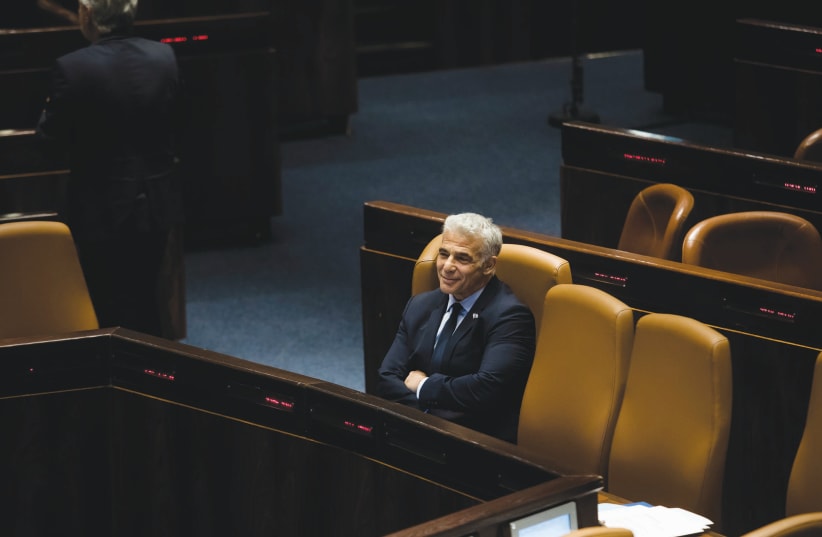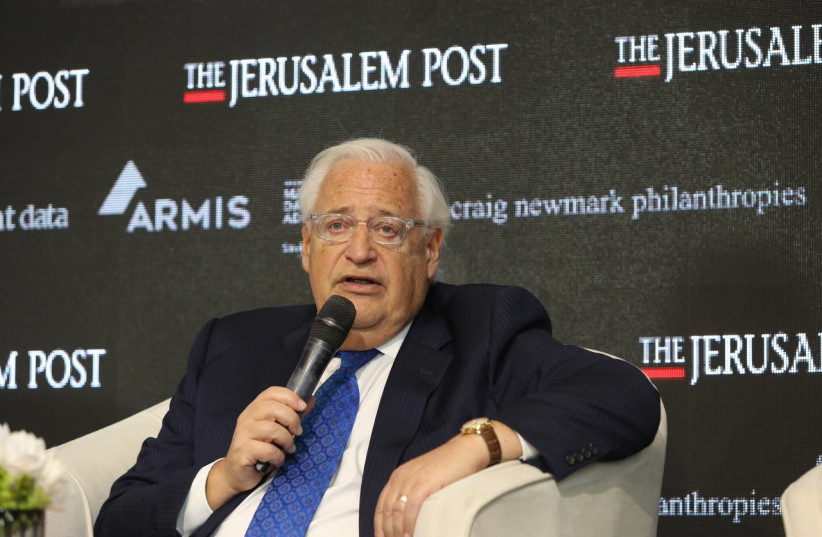■ IN HER report last week that Prime Minister Yair Lapid would live in an apartment in a building inside the security perimeter in Balfour Road and not in the prime minister’s residence that has been vacant for more than a year, The Jerusalem Post diplomatic correspondent Lahav Harkov noted that Naftali Bennett had not moved in there because the Israel Security Agency (Shin Bet), had sought to make extensive renovations to upgrade the security of the structure.
How is it that those renovations were not undertaken during the year in which the building was unoccupied? The heavy security, which once dominated the two streets which intersect at the corner of the Prime Minister’s official residence, disappeared, and although sounds of human voices from behind the high fence surrounding the building were occasionally heard, there was no sign of vehicles belonging to construction companies.
If the Prime Minister’s Residence was safe enough for opposition leader Benjamin Netanyahu and his family, why was it not safe enough for Naftali Bennett or Yair Lapid? Surely the premises in an apartment building will be even less safe, though admittedly there are currently large sacks of building materials at the entrance to the apartment house next door to the Prime Minister’s Residence, in addition to which, once Lapid moves in, media reports will, at last, be correct in stating that the prime minister lives on Balfour. The entrance to the official residence is in Smolenskin.
Even though Bennett had the briefest stint as prime minister, he will probably be remembered as the most gracious and polite – not a bad legacy to leave in a dog-eat-dog political environment such as that which exists in Israel.
■ ANYONE PLANNING to be in New York on July 14, and wanting to catch up with former US ambassador to Israel David Friedman, will find him at 7 p.m. at the Center for Jewish History where he will be engaged in conversation with Algemeiner’s editor David Efune. They will discuss Friedman’s period of tenure in Israel, as well as his book Sledgehammer which chronicles a large slice of his diplomatic experience. Tickets are limited, so anyone who wants to be there should order now. The cost is $15. Anyone who wants to also attend the 6 p.m. VIP reception preceding the event, will be asked to pay $50. For reservations and further information contact emily@theaj.com
■ MANY IMMIGRANTS who come to Israel from Argentina are already fluent in Hebrew thanks to the excellent Jewish education system of the Argentine Jewish community. A large proportion are equally fluent in Yiddish, the language so often pronounced as dying, yet constantly enjoying revivals, including with a global reach. A recent example was the partnering of Bar-Ilan University with the Institute for Yiddish Research in Argentina for a first-time international seminar in Buenos Aires under the title of “The Chronotope of Yiddish: Language, Space and Time.”
This first-of-its-kind seminar was jointly organized by the Clara and Yizchak Sznajderman Chair in the Study of Yiddish Culture and Hasidism at Bar-Ilan’s Berman Department of Literature of the Jewish People, and the Institute for Yiddish Research, which operates within the framework of the IWO Foundation (Fundación IWO).
IWO is an esteemed, veteran organization whose activities have been fully dedicated to Yiddish culture since its establishment in 1928. IWO preserves, researches and disseminates documentary materials on Yiddish culture, in cooperation with research and educational institutions around the world.
The Sznajderman Chair at Bar-Ilan was originally established by the Sznajderman family of Venezuela in 1968 as a chair in the study of Hasidism. In 2019, Prof. Dov-Ber Kotlerman, who is also a member of the Rena Costa Center for Yiddish Studies at Bar-Ilan, was appointed incumbent of the Chair, the name of which was subsequently changed to the Chair in Yiddish Culture and Hassidism.
At the seminar, Kotlerman presented a keynote lecture on “The Yiddish Writer as a Cultural Ambassador.” Additional lecturers were from the Institute for Yiddish Research, as well as the University of Buenos Aires.
Prior to the event, the Israeli Embassy in Argentina disseminated information about the seminar and was thereby instrumental in attracting a large audience, despite COVID-19 restrictions that are still in place in Argentina.
■ WHEN THERE is news of Jewish groups coming from India, they are usually brought by Shavei Israel, the organization founded by Michael Freund, which this year celebrates its 20th anniversary. Shavei Israel works to restore the Jewish heritage and identity to lost and hidden Jews around the world and bring them to Israel. It has brought literally hundreds of Jews from India to Israel.
On another theme, when one hears of people who are adults celebrating their bar and bat mitzvot, they are usually very senior adults who are Holocaust survivors, or individuals who turned 12 or 13 during a severe economic depression and were denied their official rite of passage.
Last week, in a moving ceremony held at the Western Wall, dozens of young Jews from India celebrated their bar/bat mitzvot and in the case of those who did not have them, they were also given Hebrew names.
The celebrants were brought to Israel by Israel Experience, the Jewish Agency’s education subsidiary, and once in the country, they came under the wing of Birthright. In fact, after a five-year hiatus, this was the first Birthright group from India.
Most of the participants had not been to Israel before, though several have relatives here. They were somewhat older than 12 and 13, and perhaps because they were aged 18-25, they had a better appreciation of what it meant to celebrate their Jewish coming of age at the Western Wall.
The excitement reached a peak when the bar and bat mitzvah celebrants approached the Torah as their friends sang “Siman Tov u’Mazel Tov” (A Good Sign and Good Luck) and threw candies at them, as is the usual custom.
Among the celebrants were a brother and sister, Eliran, 19, and Ma’ayan, 20, who were born in Mumbai and as children, came on aliyah with their parents. Because the parents had difficulty in acclimating in Israel, the family soon returned to India.
Now Eliran and Ma’ayan are considering making aliyah again, and Eliran even plans to enlist in the IDF and serve in a combat unit. “We want to make aliyah and return to Israel for good. I hope to be a fighter and do my part,” he said.
“I received the name Netzah at my bar mitzvah ceremony,” said Sijay Navarker, 21. “ I think we should help the IDF to win and I want to play my part. I am excited to meet everyone here and that I got to know more Jews from Mumbai.”
Roshanah Tambada, 21, received her unique first name because she was born on Rosh Hashanah: “I am excited to be here with everyone and I would like us to establish a new community of young Jews from Mumbai. It is very exciting to be with the Jews in the State of Israel. I no longer feel alone.
Mumbai, is home to an estimated 1,500 Jews out of a total population of nearly 12 million people. While it has a Chabad center, it does not have an organized Jewish community.
“That’s why we don’t know each other even though we’re from the same city,” explained one group member.
“They had to come to Israel to know that there were other Jews in the city,” the group’s guide added.
Some of them have modern Israeli names such as Shahaf, Ofek, Eliran and Lior, and intend to stay in Israel for a while after the Birthright program. They are familiar with the country’s geopolitical situation.
Taglit-Birthright Israel CEO Gidi Mark anticipates that during the summer Birthright will bring approximately 30,000 young Jews from many countries to Israel. “The possibility of bringing tens of thousands of young Jews to Israel every year is a key factor in strengthening the connection between Israel and Diaspora Jewry, and we continue to expand our activities all the time,” he said.
Hannah Pri-Zan, chairwoman of the Israel Experience, found it “very moving” to meet the participants from India during the powerful ceremony at the Western Wall. “I am confident that the bat and bar mitzvah ceremonies will be an important milestone in strengthening their identity and connection to Israel,” she said.
■ SOONER OR later all roads from Israel lead to either Morocco or Dubai. On November 25 Chemi Peres – the chairman of the Peres Center for Peace and Innovation – together with Founder and Director of the Peres Circle of Friends Yona Bartal, will be leading a group of the Friends to Morocco on a comprehensive, multi-faceted tour up to and including November 28. The group will have the opportunity to network with Moroccan innovators, business people and political figures and will return to Israel just in time to celebrate the 75th anniversary of the United Nations’ Partition of Palestine.
■ ZIONIST VISIONARY Theodor Herzl died on July 3, 1904, so it is appropriate to have a discussion on Herzl and Zionism on a date close to the anniversary of his passing. On Wednesday, July 6, the Tel Aviv International Salon will bring together two writers who have written extensively about Herzl and Zionism. One is historian Michael Oren, who is also a former deputy prime minister and MK, as well as a former ambassador to the United States, and the other is Gol Kalev who recently launched his book Judaism 3.0.
The event, in English, will be held at 7.30 p.m. at Social Space in Kikar Atarim near the corner of Nordau, 165 Hayarkon Street, Tel Aviv. The event, which includes a Q&A session with the audience, is free of charge but is limited to young professionals in their 20s and 30s.
Registration is required at https://ZionismSalon.eventbrite.com
greerfc@gmail.com

